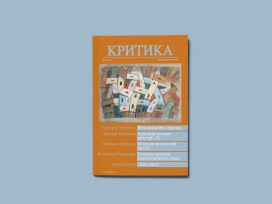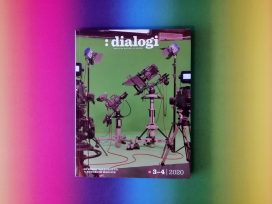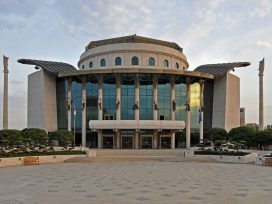After his return from the Homo Alibi festival in Riga, one of the participants in the Mobile laboratory of theatre and communication, an initiative of the F.I.T. – European theatre festivals network (Exodos Ljubljana is one of its members) – stated in The Guardian that British theatre has a serious problem.
Andrew Haydon, a critic from the younger generation who had visited five theatre festivals in continental Europe, was enthusiastic about the liveliness of happenings and the communication between theatre environments in Europe, but at the same time horrified by the fact that the presence of Great Britain is excluded from the stage trends of the European theatre sphere (even though this is not always a weakness to bemoan), and moreover is not especially missed. The a priori superlative value that is being attributed to the English scene due to its global linguistic dominance is ambivalent. Inspirational names of the English “new theatre” are less frequent: periodically, this is refuted by English playwrights or (as in recent years) by the group Forced Entertainment, but any further traces of the integration of British theatre into the European theatre scene are absent.
On the other hand, Ljubljana has – since the opening of the suitable venue Cankarjev dom in 1981, and in particular since the establishment of the Exodos festival in 1995 – selectively but regularly hosted performances of well-known directors’ names of the theatre continent, recently Stefan Kaegi or Alvis Hermanis. The British island today remains rather distant from the mainstream of the European stage climate (thanks to the LIFT festival, Britons have been exposed to Societas Raffaello Sanzio since the 1980s, and also the Mladinsko theatre presented Missa in a minor by Ljubisa Ristic there in 1985). In the globalized environment, the cultural agility of the British seems to be rather alienated.
The British situation makes us ask ourselves: who beyond members of our own “tribe” know the names of Slovenian directors? The reason for the Slovenian absence from the European theatre conversation is partly the fact that as a nation we were conceived immaculately, as Lev Kreft recently put it, unconnected to colonial appetites and its derivations. The dynamic participation in the actual discourse is missing, but let’s for the present skip the marginality of a small nation in the art system or the lack of financial or promotional support by the state which is usually the scapegoat for missed possibilities and an excuse for all possible in(cap)abilities.
Sebastijan Horvat reached the threshold of European theatre reflection when he was awarded the “Best young director” prize at the Salzburg Festival in 2005. However, his further efforts were not led by themes which might address the non-Slovenian public, but preferred to deal with phenomena that communicate above all with the home audience. It is interesting that the aforementioned Alvis Hermanis, who was awarded the same prize in Salzburg in 2003, has been constructing his European and North American career/presence with the utmost care, while remaining an all-round engaged artist. And however well thought out Horvat’s form of escapism (in the sense of the deliberate ignoring of potential possibilities) may seem in its own way, there has been a meaningful differentiation among Slovene theatre directors from younger generations (Vito Taufer, as an extreme representative, “conquered” the Croatian scene in the 1980s, and in the next decade continued with Silence Silence Silence!).
Emil Hrvatin works on making a greater impact with the help of his production unit Maska. Matjaz Pograjc has on a number of occasions used Zavod Bunker to connect with propulsive foreign theatre groups (the Netherlands, Latvia). Tomi Janezic regularly works in Serbian and Croatian theatre institutions, while the Via negativa group, led by Bojan Jablanovec, regularly performs at renowned European theatre venues. Outside Slovenia, the name of Iztok Kovac is familiar: since 2008, he has been letting the world find its way to his new international group EKG (EnKnapGroup) – EKG has been convincingly carrying out its work in the field of dance and theatre, with inspiring performances by the group’s guest collaborators. Is this a form of “new theatre” where the artistic leadership (as the New Riga Theatre was in 1997 entrusted to Hermanis) follow a fresh wave, adapting to the present aesthetics and conditions (in an organisational sense or its genre)? Anyway, which Slovene theatres are run by solid artistic visions at all? Why are salaries so often “body-snatchers”, depriving people of their radical spirit?
Again, we are faced with the status quo of a nation of individuals, artists, and producers on the one hand, and financiers on the other, who all wait or weigh their options for so long that they miss out on opportunities of collective marketing and promotional campaigns abroad, campaigns about which they seem to have doubts. Let’s not forget that the Latvian Hermanis is only an individual as well, stemming from a young, small country. The secret lies always in how to evoke the eros of the public that allows the artist to fulfil a certain deficiency of its own, usually a more or less stereotypical preconception of a certain kind of theatre that is regionally specific. The lack of a well-launched uniqueness is a symptom of a nation that is missing a so-called will for strategic vigour. Such is the constellation of “the domestic and the global”, a mix of circumstances and relations that keep defining us. We used to refer to universal excuses in the past, they seem handy here and now, and they will be at hand in the future. However, what is needed is a more sovereign, operative attitude that clearly recognizes its objective, in political terms (public interest) as well as on the personal level.






